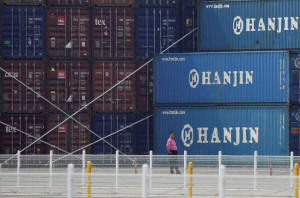|
From steaks to furniture, Hanjin Shipping
collapse to raise freight costs
 Send a link to a friend
Send a link to a friend
 [September 09, 2016]
By Karl Plume [September 09, 2016]
By Karl Plume
CHICAGO (Reuters) - The collapse of Hanjin
Shipping <117930.KS> will boost the cost to U.S. businesses and
consumers of a wide range of imported goods, from furniture and clothing
to fresh fruit and frozen meat, according to federal agencies, shippers
and retailers.
With Hanjin's future in doubt, carriers have announced they will hike
container freight rates by as much as 50 percent beginning next month as
retailers scramble to secure shipping ahead of the peak year-end holiday
season, industry sources said.
United Parcel Service Inc <UPS.N> said on Thursday it is seeing a bump
in demand for its freight services and is working with customers in Asia
to shift goods from Hanjin containers to other ocean freight operators
or air freight services. About $14 billion worth of cargo was stranded
by the collapse of the seventh largest container carrier in the world.
"Right now, there is much more (freight) demand than there is supply.
People are scrambling to find a carrier with space," said Peter
Friedmann, executive director of the Agriculture Transportation
Coalition shipping industry group.
"But the biggest challenge right now is for people with cargo on Hanjin
ships," he said.

Cargo shippers have been forced to pay thousands of dollars in fees to
terminal owners and truckers to reclaim their goods from Hanjin ships to
prevent perishable foods from spoiling and to avoid losing sales because
goods are not available when customers want them.
Hanjin would normally pay the fees for port usage and container handling
as part of its freight services. With the South Korean shipper in
receivership, it is unclear if shippers would recoup any added costs
they pay out of pocket to retrieve their goods.
Singapore-based crop shipper Agrocorp International said that DP World,
terminal operator at Port Metro Vancouver, last week held 24 containers,
or 600 tonnes, of its Canadian lentils that were bound for India and
Bangladesh, demanding a release fee of $450 per container.
Industry analysts expect the freight increases to be short-lived as more
shipping capacity comes on line.
"The Hanjin ships are going to be off the market for the holiday
seasons. It will take several months to sort through the legalities, but
any rate increase will be temporary," said David St. Amand, president of
Navigistics Consulting.
In the short term, retailers are likely to take hits to their profit
margins as they try to shield customers from any more price rises in a
hyper-competitive retail market.
[to top of second column] |

A man stands in front of shipping containers at the Hanjin Shipping
container terminal at Incheon New Port in Incheon, South Korea,
September 7, 2016. REUTERS/Kim Hong-Ji

"We believe that (the Hanjin collapse) will likely increase our
short to medium term ocean freight costs which will minimally impact
product cost in all of our operating segments to varying degrees.
However, inventory availability is good," Paul Toms, CEO of Hooker
Furniture <HOFT.O>, said on an earnings conference call on Thursday.
Joe Parsons, CFO for Michael Kors <KORS.K>, said from the Goldman
Sachs retail conference on Wednesday that the company does not
expect a significant long-term impact on its business. But "there is
going to be some pricing pressure. At this point, we are continuing
to evaluate it," he said.
The American Apparel and Footwear Association said it expects gross
margins to be pressured in the near term by the higher shipping
prices and additional unloading fees.
Hanjin's collapse could wreak havoc on port operations and shipping
lines over the next two to three months and could impact trade
between the United States and South Korea, the U.S. Department of
Agriculture said in a report published on Thursday.
Container freight charges have more than doubled since May and could
appreciate further, the agency said. The average cost to move goods
in 40-foot containers from the U.S. West Coast to Asia was quoted at
$1,700 this month, up from $788 in May.
(Aditional reporting by Nandita Bose in Chicago, Rod Nickel in
Winnipeg and Liz Hampton in Houston; Editing by Bernard Orr)
[© 2016 Thomson Reuters. All rights
reserved.]
Copyright 2016 Reuters. All rights reserved. This material may not be published,
broadcast, rewritten or redistributed.
 |